OFF THE SHELF: OCTOBER 2023

OFF THE SHELF: OCTOBER 2023
Oxford spies, Hobbes, family unravellings, the evils of American mass incarceration and a wonderful poetry collection
Published: 17 October 2023
Author: Richard Lofthouse
Share this article
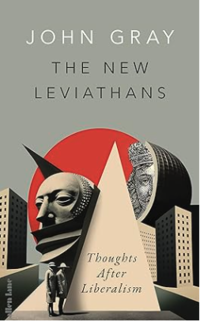
The New Leviathans: Thoughts After Liberalism by John Gray
One of Oxford’s greatest thinkers, John Gray (Exeter, 1968) spoke to Oxford alumni in September about his book The New Leviathans, published the same month. Speaking without pause or notes he discussed some of the horrors of the 20th century and did so consciously walking in the shoes of his friend and mentor the late Sir Isaiah Berlin (Corpus, 1928). Ever since its publication in 1651, Thomas Hobbes' Leviathan has unsettled and challenged how we understand the world. Condemned and vilified by each new generation, Hobbes' cold political vision continues to see through any number of political and ethical vanities. Gray’s reading of Hobbes helps us to better locate the world of the 2020s with all its contradictions, moral horrors and disappointments. The collapse of the USSR ushered in an era of near-apoplectic triumphalism in the West: a genuine belief that a rational, liberal, well-managed future now awaited humankind and that tyranny, nationalism and unreason lay in the past. Since then, so many terrible events have occurred and so many poisonous ideas flourished, and yet still our liberal certainties treat them as aberrations which will somehow dissolve away. Hobbes would not be so confident. John will return to Oxford to discuss these themes again on November 8, when he will deliver the Pharos Lecture in the Sheldonian Theatre at 5pm.
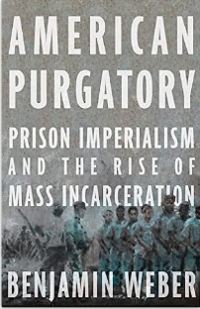
American Purgatory: Prison Imperialism and the Rise of Mass Incarceration by Benjamin D. Weber (The New Press: 3 Oct 2023)
A visiting student to St Edmund Hall in 2006 and today a Professor of history at University of California, Davis, Weber offers here a history of American prison ideology that blazes with interconnection. If you grew up with the idea that America was essentially ‘anti-imperialist’ – or at least anti-British empire as Roosevelt made plain, then think again. The book begins with a map titled ‘United States Empire’ and shows all the ‘colonies’, central to which was the Philippines (1899-1946), American Samoa, Guam, the US Virgin Islands and eight further Pacific Trust Territories that continue to this day. But the book begins with ‘imperialist’ incursions into then Spanish-controlled Florida in the early 1800s, to smash the so-called Black Fort, a centre for slave fugutives, and support the doctrine of slavery while exerting American muscle against Spain. Focusing on Fort Marion, a prison in Florida, Benjamin sets up a book structure focusing on the history of individual prisons, often tracing the narratives right through to the Civil Rights Movement of the 1960s and indeed former President Trump’s treatment of migrants. Central to the book’s critique is this idea that non-white communities within the US were routinely treated as ‘internal colonies’, epitomised by the Indian Removal Act of 1830. Meanwhile ‘overseas colonies were administered like geographic prisons.’ Mass incarceration followed the end of slavery and prisons thus became ‘the epicentre of racial state violence.’ There are some people to whom none of this will come as a shock or a surprise, and many more for whom it may well do so as part of a broader narrative that undoes some of the cherished myths the West has about itself as the progressive driver of human rights. In fact, American Purgatory reminds us of The Curse of the Nutmeg by Amitav Ghosh, in which he too narrates the racially-differentiated slaughter of non-white people, in this case mostly enacted by Dutch colonialists. It’s an ugly past that is increasingly being put front and centre by talented scholars.
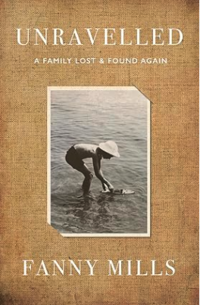
Unravelled by Fanny Mills (Unicorn: 17 Oct 2023)
The author (Univ, 1983), explores her family history and it’s pretty epic, linking together various threads across the Royal family, the Easter uprising, author John Berger, the Earl of Erroll of White Mischief fame and novelists Kingsley and Martin Amis. Fanny unpicks the threads of her comically nuclear family with its deep silences to find what lay hidden, never to be spoken of. This highly personal, yet page-turning story weaves explores the damage done by secrets. Beneath the carefully woven fabric of her family life, she finds a clash of cultures – on one side Jews fleeing the pogroms of Eastern Europe, and on the other the highest levels of the British aristocracy. The writer and thinker John Berger mysteriously links both worlds. She finds two grandmothers whose bids to find freedom and fulfilment ended in utter disaster. Her parents, shiny young communists of the 1950s airbrushed both women out of history. But what happens when you deny the past? How do you negotiate your sense of identity?
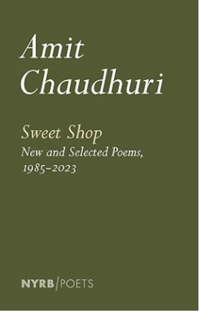
Sweet Shop: New and Selected Poems 1985-2023 by Amit Chaudhuri (New York Review Books: 3 Oct 2023)
Amit Chaudhuri, one of the most exploratory writers of English-language fiction, has also written and published poetry throughout his career as a novelist, poetry that shares many of the concerns of his prose while sounding a distinct and memorable note of its own. This book collects the greater portion of that work for the first time, starting with St Cyril Road, named after a street in Bandra, a suburb of Bombay to which Chaudhuri's parents moved in the early eighties. On visits to them from the UK, where he was studying, Chaudhuri found his attention drawn to the minutiae of streets and balcony-level sightings with a sense of everyday discovery that he then brought to his poems. In subsequent years he largely abandoned poetry, until a visit in 2018 to North Calcutta to photograph the interiors of sweet shops led to a new volume, Sweet Shop. If St Cyril Road is about being and looking, Sweet Shop is about the taste of living. It was followed by the poemsin Ramanujan (named after the great mathematician), which trace the way Chaudhuri's life has been intertwined with various cities, as well as poems that serve as elegies for his parents. This collection also has the essay "Interlude," about Chaudhuri's parents' move to Bandra and his beginnings as a poet, a selection of songs, and some unpublished new poems.
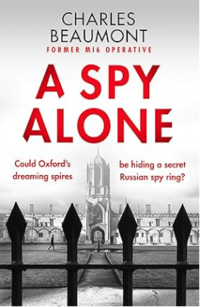
A Spy Alone by Charles Beaumont (Canelo: 26 Oct 2023)
The pseudonymous author went to Oxford and that much is plain from the level of delightful and intricate detail offered, including a delicious Oxford conceit concerning the name of a fictitious shell company in the British Virgin Islands that starts to unravel a riddle revealing in an Oxford spy ring. Inspired by the Cambridge spies Burgess, Philby, Blunt, in that sense this work by a former MI6 officer is inspired by the past. Yet in every other sense it looks right at the world of 2022-23, in which all the rotten meat of the decaying Soviet Union and tawdry pursuit of money has been replaced again by high stakes geo-politics. The book avoids tired spy novel cliches and is accurate in the little details. WhatsApp has already been replaced by Signal, for example. Meanwhile the exposition is gently to hand and never cumbersome, explaining in one place what being on a train from Przemyśl in Poland to Lviv in Ukraine was like in June 2022, and in another why Germans of a certain sort have always wanted to be pally with Russians – as in, the latter are not quite European but then again they’re not Chinese or Muslim, and they reliably buy armoured, high profit margin Mercs. The obvious companion volume for A Spy Alone is the non-fiction Butler to the World: How Britain Became the Servant of Tycoons, Tax Dodgers, Kleptocrats and Criminals, by Oliver Bullough, which is essentially the world we are placed in here, in which pragmatism and cynicism become indistinguishable from one another except for the sudden turn of events last February, which saw a straightforward invasion of a sovereign state by a certain Vladimir Putin. The only possible trouble with the Oxford content is that it doesn’t make for comfortable reading for the University, involving as it does a Russian oligarch and a donation. ‘You know what these universities are like: terribly risk averse, but desperate for the money.’ A great relief to find out that the spy ring uncovered amidst the quadrangles is fictitious. Or is it? Anyone reading this may start to populate the fiction with remembered, real characters, to the point where the essential premise of the novel is tantalising rather than escapist. The late Norman Stone is brilliantly brought back to life while the key female don at Christ Church is also suggestive of a particular individual.
Off the Shelf typically concerns books where there is an Oxford connection, whether the place, the University or of course the author. Our editorial selection rests on books appealing to the broadest alumni audience.
Alumni can claim 15% discount in any Blackwell's store with a My Oxford Card.
Alumni can claim 20% discount at Oxford University Press.
Join the Oxford Alumni Book Club at: www.alumni.ox.ac.uk/book-club
Lead image: Getty Images















